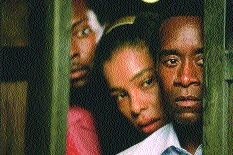Room at the inn

In 1994 Paul Rusesabagina, a hotel manager in Kigali, Rwanda, risked his life to help save more than 1,200 men, women and children from the ethnic cleansing that wiped out nearly 1 million Rwandans in 100 days. Through this true story Hotel Rwanda tells the story of the genocide in Rwanda. Directed and co-written by Terry George (Some Mother’s Son), the film is designed as a cinematic wagging finger, shaming the world in general and the West in particular for having done nothing while innocents were butchered in the streets.
Hotel Rwanda does not elaborate on the bleak history of this tortured nation, which has suffered at the hands of European occupiers dating back to the early 1900s. It does not detail the genesis of the tribal conflict between Hutus (the majority in power) and Tutsis (the minority rebels) nor focus on the political machinations and backroom deals that led to the start of the slaughter.
It starts off with a quick expository radio report that catches us up on the action from the Hutu point of view, and then introduces us to Paul (Don Cheadle, in a stirring performance), who knows what his customers want and how to get it for them. The customers are mainly foreigners, along with wealthy Rwandans.
Employing style, humor, resourcefulness and not a small amount of flattery, Paul, a Hutu, runs a tight ship at the Belgian-owned Hotel Mille Collines. And he stores up favors in case he needs them someday for his family, which includes his Tutsi wife, Tatiana (Sophie Okonedo), and three children.
At first, the situation seems promising. A United Nations peacekeeping force, led by the optimistic Colonel Oliver (Nick Nolte), is in place, and a long-awaited peace accord is about to be signed. But when the Hutu president is killed immediately after the signing, extremist Hutus blame the Tutsis and start their bloody rampage, doing most of their killing with machetes. (It is soon revealed that the Hutus themselves were behind the president’s death.)
Paul’s well-ordered world comes crashing down as many of his Tutsi friends and relatives are rounded up and presumably killed. Returning home from work one night through burning streets, he finds a dozen or so Tutsi neighbors hiding at his house. They have come to him because he is a good man and the only Hutu they can trust.
Paul takes them in, bargains for their lives, and once back at the hotel he continues to accept terrified Tutsis (the Hutus call them “cockroaches”) from all corners of the exploding city. Adopting the attitude that “there is room at the inn,” he fills every nook and cranny of the hotel with those fleeing the terror in the streets.
One of Paul’s most masterful cons is convincing the Hutu militia and the local police that the hotel is some sort of “Western safe zone,” and that if they try to come inside, the American military will swoop down and punish them.
Paul knows, however, that it is only a matter of time before his walls come tumbling down, and that there must be some form of international intervention to save them. But none is forthcoming. Though many countries send soldiers to rescue their own citizens, none seems to care about the Rwandans left behind. The UN force starts to dwindle, and in one of the film’s most moving and disturbing scenes, a disgusted Colonel Oliver explains to Paul through gritted teeth that the rest of the world thinks Paul is dirt, for no other reason than because he is a black African.
Much of the brutality of events is muted or takes place off-screen—a wise decision, since the PG-13 rating opens up the film to a wider audience, which can learn some lessons about political and moral responsibility. To that end, the film replays part of the infamous 1994 press conference at which a U.S. government spokesman splits hairs about the difference between “acts of genocide” and “genocide.”
The question that lingers at the end of the film is whether the world has learned anything from the Rwandan genocide.





